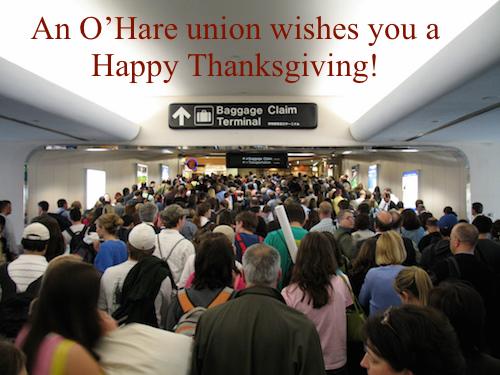O’Hare Union Plans to Leave Travelers Stranded

By Matthew Benzmiller
Hundreds of workers at the O’Hare International Airport in Chicago have threatened to strike during one of the peak periods of holiday travel, Thanksgiving week.
They claim that they are not trying to halt airport operations, but to slow them and make their demands be heard for a $15 wage and better working conditions.
The Service Employees International Union (SEIU) Local 1 organized the strike vote earlier this week among mostly airplane cabin cleaners, wheelchair attendants, janitors, and baggage handlers. According to the SEIU Local 1, 500 workers have agreed to strike some time before Thanksgiving among a vote of about 2,000 workers. Most of the workers are non-union and work for private contractors at the airport.
The Chicago Department of Aviation says they are open to dialogue with all parties, yet despite this, contracted workers think they need to walk out on their bosses, not the airport itself, to make a point to the O’Hare Airport about their wages. A spokesman for the Chicago Department of Aviation said they expect to see no disruption of service during the holiday season. Auto club AAA says Thanksgiving week will be a very busy travel period.
Because these workers are not unionized, this can be seen as 500 employees not showing up to work without notice, and possibly for several days. In most work places this would be cause for reprimanding an employee, losing possible future raises in salary, promotion opportunities, any possible perk to being a productive employee, or even lose their job. These workers are independently contracted and we have no idea how those employers will react.
Cleaning plane cabins, janitorial work, pushing wheelchairs, and handling baggage are all positions that most any able-bodied person could do, granted a background check is passed. This pushes wages down because there is a high supply of it in the labor market, while demand remains relatively the same. This basic facet of labor economics is not understood by unions, striking laborers, or legislators who promote minimum wage legislation.
The average wage for janitors in the United States is roughly $11 an hour. Yet some janitors at the O’Hare International Airport feel it should be $15 with no other justification other than that they feel what they receive now is too low. This ignores the basic reality of how wages work. If the labor produced from a worker is worth $11 an hour and an employer is demanded $12 for that same work, an employer will attempt to contract out his needs to another worker for market price and cut the worker who demands $12.
As for working conditions, the Chicago Department of Aviation does say they are open to discourse about the concerns workers have. Rather than abandoning contracted work that they agreed to beforehand to inconvenience the airport, a conversation with officials and workplace bosses is a more efficient and professional route to take.
Those workers made an agreement to do the work they do for the agreed upon wage. To walkout on that agreement is wrong and the wrong way to negotiate between employees and employers. Both should hold up their respective ends of the deal, and if either isn’t, first a discussion about those grievances should occur. If it cannot be solved that way, then legal action or switching employers is the right thing to do, not abandoning your end of the deal.





